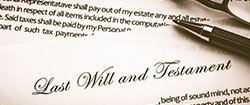Exceptions to Discharge in Bankruptcy
Most of us are aware that declaring bankruptcy gives people an opportunity to block or eliminate debt payments in the event of extreme financial hardship. You may even be familiar with the term “bankruptcy discharge,” which is the release of legal liability over a debt. What many people don’t know is that not all debt is eligible for discharge.
Unless there is litigation that objects to bankruptcy discharge, eligible debts could be eliminated automatically. Creditors will be notified that debts owed to them have been discharged and to cease collection efforts. However, there are certain exceptions to discharge related to how the debt was acquired. Tax payments, court payments, governmental fines or loans, and spousal or child support payments are some of the most common nondischargeable debts. Debts acquired through fraud cannot be discharged, and neither can breaches of fiduciary duty such as embezzlement or larceny. Debts related to willful or malicious injury or property damage are also nondischargeable.
Though filing for bankruptcy can relieve significant financial burden from people, a debtor does not have an inherent right to discharge their debts. Certain types of debt are automatically excluded from the discharge process, and some debts can be contested in court. It is important to have an accurate expectation of which debts you’ll be able to eliminate before beginning the process of filing for bankruptcy.


